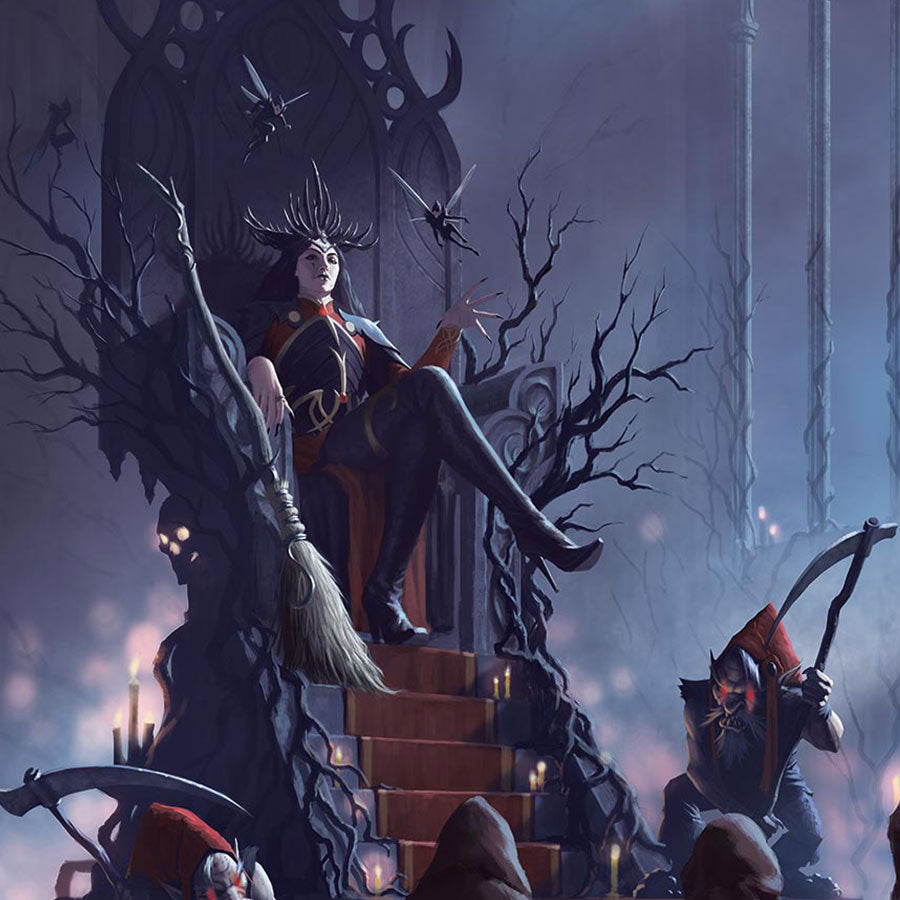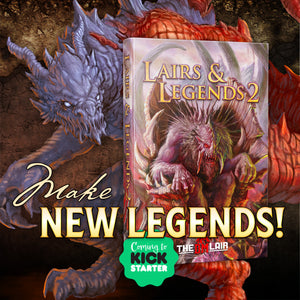Why Gatekeeping Is Good in D&D

By Luke Hart
Let's talk about gatekeeping—that typically ugly little monster that sometimes finds its way into TTRPGs in general and ruins the experience. I argue that while this can definitely be the case, there are actually TWO types of gatekeeping; one is bad, and the other is good.
By the way, if you’re looking for a low-level, fifth-edition adventure module, check out Into the Fey. It’s designed for levels 1 to 5 and features lots of new fey creatures and their tricksy plots. Pick up the Into the Fey Ultimate Bundle to get the hardcover, the PDF, digital maps, and digital tokens!
Watch or listen to this article by clicking the video below.
First, let’s talk about the BAD type of gatekeeping—which you probably already know about—and then we’ll hit the GOOD type.
BAD gatekeeping is any effort to keep “undesirables” out of the hobby in general. Now, the definition of an “undesirable” will vary depending on who is doing this type of gatekeeping. Historically, they tend to focus on certain categories such as gender, race, experience level, or play style. For instance, I’ve heard that some people engaged in this sort of gatekeeping might want to keep women out of the hobby, or they might disdain players who play the game differently from how they think the game “should” be played. The permutations of this are varied.
Frankly, this type of gatekeeping is stupid. Someone may personally not like playing with certain people, but that is a ridiculous basis for keeping anyone out of the hobby as a whole. Just because you don’t want someone playing in YOUR game, it doesn’t mean they shouldn’t play in ANYONE’S game. I mean, there’s just no rational reason to take that stance. Nobody is ruining your precious hobby. There’s plenty of room for everyone in tabletop RPGs, and I would argue that a confluence of thoughts, personalities, and playstyles STRENGTHENS the hobby. I know that it has certainly made my games better.
Now, let’s talk about the GOOD type of gatekeeping, which is what everyone is doing already—including you—even if you don’t realize it. Even I do it. For example, over the years of running games, I have developed a particular distaste—you might even say disdain—for a particular type of player: the rules lawyer. This is the dude who will argue up and down with the game master for extended periods, bring gameplay to a halt, and generally ruin the fun atmosphere of almost any game. As a consequence, players who behave like that usually don’t last long in my games. Once they rear their ugly heads, they either learn to control themselves or leave. It’s as simple as that.
The fact is not all people are compatible. I’m sure that a rules lawyer I drive away will probably be welcomed at other tables. But they won’t survive at my table, and maybe not yours.
You see, a pernicious thought I have seen is that ALL PLAYERS, regardless of compatibility, should be welcomed at ALL GAME TABLES. In other words, even if someone is not a good fit and makes the game less enjoyable—or just downright not fun at all—everyone should simply cowboy up and endure it. And one of the ways we know this is ridiculous is that even those who espouse this belief will break it under the right conditions.
For instance, if a player starts spouting off racial slurs or gaslights to manipulate others, I bet almost any group is going to eject them in short order. And even absent negative behavioral issues, not all playstyles are compatible. Take a group full of players who love social interaction and the talky-talky bits, and give them a player who attacks anything that moves at first sight. There’s going to be some discord in that group, and fast.
Of course, many of these issues can be discussed and resolved to everyone’s satisfaction, and the game can go on. However, sometimes it’s just not meant to be. Sometimes there are simply unresolvable differences between people, and the best solution is to part ways.
Everyone does this “micro” gatekeeping, and I argue it is beneficial for your individual games. I mean, why do you play D&D, Pathfinder, or Dungeon Crawl Classics to begin with? It’s to have fun, isn’t it? So, if a person isn’t a good fit and doesn’t contribute to the game’s overall fun, you have to ask yourself, “Why are they there?” Of course, if you’re a counselor using tabletop RPGs to reach troubled youth or a teacher using it in the classroom, obviously, you have a different goal. But I’m not talking about that. I’m talking about the standard, run-of-the-mill group; we’re all there to have fun.
So, please, feel free to continue playing with others that you enjoy playing with, but as far as “macro” gatekeeping goes—trying to keep certain categories of players out of the hobby as a whole—I don’t believe there’s any room for that. This isn’t your hobby, after all; it’s our hobby.
So, what does this mean for you?
First, if you’re a game master and feel like one of your players just isn’t a good fit for the group, don’t be too hasty to kick them out. The first step is always talking with them, discussing what the issue might be, and seeing if you can resolve it. I’ve resolved most of problems in my games by simply putting on my big-boy pants and talking to my players.
And my preference is to do it face to face, not over email or Discord messages. Shoot—even over the phone via voice is better. A lot of meaning gets lost when you can’t hear the tone of one’s voice and when the conversation doesn’t happen in real-time. There’s always a chance that what seemed like it wasn’t meant to be will turn out just fine. However, if it doesn’t, there is nothing wrong with parting ways, and you shouldn’t feel too bad about it. There are lots of things outside our nucleus of control in this world, and this is often one of them.
Also, as the game master, don’t forget that getting other players’ input on the matter can be very helpful. Especially if you sense there is friction between most of the players and one other, it can be super helpful to ask them what’s going on and what is causing the friction for them. This can give you critical insight that can aid you in resolving the issue.
Now, if you’re a player who feels like you are being gatekept out from a group, I suggest not being too hasty in assuming it’s because of a category you belong to—the BAD type of gatekeeping. It could be something less hurtful, such as a matter of playstyle differences. As far as what you should do, you have a couple options. You can always just drop the group—I mean, if you feel like they are excluding you and pushing you away, would you really want to keep playing with them anyway? Or, you could put on YOUR big-boy pants and talk with them about it. Try to find out what’s going on. Is it something you’re doing? And if so, how can you help make the game experience more enjoyable for everyone else?
Let me tell you, the sheer level of maturity doing something like that requires would impress the crap out of me as a GM. Normally, players would just drop the group and go straight to Twitter to complain. But someone who brings up a difficult topic with the goal of improving the game for everyone? Now, that’s pretty cool. It doesn’t mean everything will work out, of course, but it certainly improves the chances.
A 5e Adventure Module Filled with Fey Creatures and Their Tricksy Plots!
If you’re looking to start up a new 5e campaign or reboot your current one, Into the Fey may be exactly what you need. Designed for levels 1 to 5, Into the Fey contains everything you need to start playing:
- 11 fey-themed adventures
- over 40 new fey creatures
- the fully fleshed-out starting town of Aeredale
- regional information and maps for both the material and fey planes
Pick up the Into the Fey Ultimate Bundle to get the hardcover, the PDF, digital maps, and digital tokens.
Starting a new campaign can be tons of work; let Into the Fey do some of the heavy lifting for you!
-
Posted in
Game Master How-To Articles







